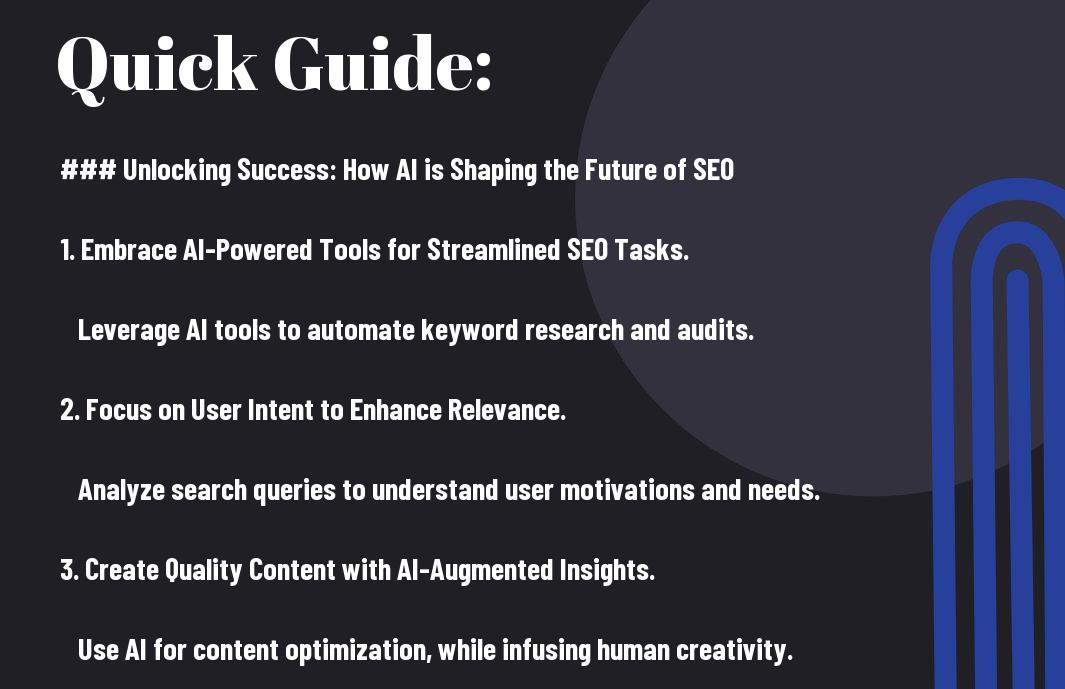
This guide will empower you to unlock success in your digital marketing efforts as you navigate the transformative impact of AI on SEO. With search algorithms evolving to prioritize user intent and personalization, it’s important for you to adapt your strategies accordingly. You’ll discover how AI can enhance your content creation, optimize your keywords, and automate key tasks, ensuring you stay ahead in an increasingly competitive landscape. Prepare to implement these important strategies and watch your search engine rankings soar as you harness the power of AI.
Key Takeaways:
- AI-Powered Algorithms: AI is revolutionizing SEO through advanced algorithms that enhance search result accuracy and personalization, shifting focus from mere keyword matching to understanding user intent.
- Content Creation Efficiency: Generative AI tools streamline the content creation process by automating tasks, which saves time and boosts content quality, but human creativity remains integral to making content relatable and engaging.
- Balancing Human Touch and AI: A successful SEO strategy blends human expertise with AI capabilities to ensure content resonates with users while leveraging data analytics for improved SEO performance.
- Focus on User Intent: Emphasizing user intent in content strategy, such as understanding the distinction between informational and transactional queries, ensures that content effectively meets audience needs at all stages of the user journey.
- Regular Strategy Updates: SEO is an ongoing process; continuously refining your approach using AI-driven insights and performance metrics is key to staying relevant in an evolving digital landscape.

The Types of AI in SEO
While exploring the dynamic landscape of SEO, it’s necessary to understand the various types of AI technologies reshaping strategies and enhancing performance. These AI technologies play a pivotal role in making SEO more efficient, allowing you to leverage their capabilities for better visibility and user engagement. Here are some key types of AI utilized in the SEO realm:
| Type of AI | Description |
| AI-Powered Algorithms | Algorithms that utilize machine learning to provide more relevant search results based on user intent. |
| Generative AI | AI models that create content, enhancing both the quality and efficiency of your content strategy. |
| Predictive Analytics | AI tools that analyze data patterns to forecast user behavior, enabling targeted marketing efforts. |
| Natural Language Processing | AI that understands and interprets human language, refining keyword strategies and content relevance. |
| Chatbots | Automated communication tools that enhance user interaction on your site, improving user experiences. |
The growing influence of AI in your SEO strategies not only enhances efficiency but also tailors the user experience, making your approach to content creation and optimization more effective.
AI-Powered Algorithms
Algorithms have fundamentally changed the SEO landscape, transitioning from simple keyword matching to sophisticated systems that comprehend user intent. With tools like Google’s RankBrain, these algorithms analyze vast amounts of data to present search results that are not only relevant but also personalized based on user behavior and preferences. This shift means you must adapt your SEO tactics to align with these advanced algorithms, focusing on the contextual relevance of your content.
Moreover, the need for quality content tailored to specific user needs is paramount. As algorithms become increasingly adept at interpreting semantic search, your content strategy should shift towards creating content that resonates with your audience’s questions and intentions. Utilizing AI-powered tools can help you refine your approach by providing insights into user behavior and content performance.
Generative AI for Content Creation
Types of generative AI have revolutionized the way you approach content creation, enabling faster production without compromising quality. This technology can analyze trending topics, user queries, and effective formats to generate optimized content that aligns with SEO best practices. By saving you time and effort, generative AI allows you to focus on higher-level strategy and creative output, adding value to your overall content plan.
It’s important to recognize that while generative AI can significantly enhance content efficiency and quality, there exists the potential risk of sacrificing authenticity in favor of automation. Thus, while using AI for content generation is immensely beneficial, you must ensure that your unique voice and perspective remain evident in your content. This balance between automation and human creativity is necessary for fostering strong connections with your audience, leading to improved engagement and ultimately better SEO performance.

Key Factors Influencing SEO in the AI Era
Some of the key factors influencing SEO in the AI era revolve around understanding user intent, enhancing personalization, and leveraging AI-driven tools. These elements can fundamentally transform your approach to SEO by ensuring that your content resonates with the evolving needs of your audience. Here are some critical factors to consider:
- Understanding user intent and behavior
- Implementing strategies focused on personalization
- Utilizing AI-driven tools for optimization
- Engaging in comprehensive keyword research
- Regularly updating your content strategy based on data
After embracing these strategies, you will enhance your visibility and effectiveness in the competitive digital landscape. For a deeper insight into how to adapt your strategies to the influence of AI, check out AI Is Driving The Future Of SEO: How To Adapt.
User Intent
Many businesses underestimate the importance of user intent in influencing their SEO strategies. It’s not just about finding popular keywords; you must also consider the underlying intention behind those keywords. By conducting a thorough analysis, you can tailor your content to meet the specific needs of your audience, whether they are seeking information, making a purchase, or searching for answers to specific questions.
Recognizing informational versus transactional queries can dramatically enhance your site’s relevance in search results. By honing in on user intent, you can attract not just any traffic, but the right traffic that better aligns with your goals, ultimately leading to higher conversion rates.
Personalization
For effective SEO in the AI era, harnessing personalization can significantly enhance user engagement and satisfaction. Tailoring your content according to the unique preferences and behaviors of your audience fosters a deeper connection and increases the likelihood of conversion. This means you should utilize data analytics to understand who your audience is, what they like, and how they behave across different touchpoints. In doing so, you can create tailored content that speaks directly to their interests.
Understanding the intricate relationship between personalization and user experience is vital. By crafting highly personalized experiences that meet user demands, you build trust and encourage repeat interactions. As a result, you can see positive outcomes such as increased website traffic, improved engagement metrics, and better SEO performance, boosting your overall digital marketing strategy.

Pros and Cons of AI in SEO
Due to the evolving digital landscape, many businesses are increasingly incorporating artificial intelligence into their SEO strategies. However, it is imperative to weigh the pros and cons of doing so. The adoption of AI in SEO presents numerous opportunities for growth and efficiency, but it also comes with challenges that require careful consideration. Below is a breakdown of the positive and negative aspects of integrating AI into your SEO efforts:
| Pros | Cons |
|---|---|
| Enhances search result accuracy through machine learning. | May lead to over-reliance on technology, diminishing human creativity. |
| Improves personalization and user experience. | AI may misinterpret user intent without proper context. |
| Automates time-consuming SEO tasks, saving time and resources. | Can generate content that lacks emotional depth and engagement. |
| Identifies high-potential keywords and content opportunities. | Quality control may suffer if AI-generated content is not reviewed. |
| Allows for continuous data analysis to inform strategies. | Potential for biased or inaccurate data interpretation. |
| Facilitates better tracking of performance metrics. | Requires ongoing adjustments and updates as algorithms evolve. |
| Boosts productivity by streamlining various SEO processes. | May increase competition as AI tools become more accessible. |
| Enables faster decision-making based on real-time data. | Risk of overlooking important niche factors unique to your audience. |
| Improves content optimization for specific demographics. | Learning curve associated with effectively using AI tools. |
Advantages of AI Integration
For marketers like you, integrating AI into your SEO strategy can yield significant advantages. One of the most notable benefits is the ability to enhance search result accuracy through machine learning algorithms, such as Google’s RankBrain. These algorithms analyze vast amounts of data to understand user intent better, allowing you to deliver content that meets users’ needs effectively. By doing so, you not only enhance the user experience but also improve your chances of achieving higher search rankings.
Moreover, AI can automate repetitive tasks, enabling you to focus on more strategic elements of your SEO plan. By using AI-driven tools for keyword research and content optimization, you can uncover high-potential long-tail keywords that align with user intent. This approach ensures that your content not only satisfies the search engine algorithms but also resonates with your target audience. Ultimately, the integration of AI can lead to improved efficiency and effectiveness in your SEO efforts.
Challenges and Limitations
On the other hand, relying on AI in your SEO strategy introduces several challenges and limitations you should be aware of. While automation can save time, it may also result in content that lacks emotional depth, ultimately alienating users. Furthermore, AI algorithms operate based on data analysis—if this data is flawed or not representative of your target audience, the insights generated may lead you down the wrong path. This necessity for accurate, high-quality data cannot be overstated, as it directly influences the effectiveness of your SEO strategies.
The dynamic nature of AI technologies also means that you must stay informed about ongoing changes and updates to algorithms in order to maintain effectiveness. The learning curve associated with effectively utilizing AI tools can pose a significant hurdle for businesses new to this technology. Finally, the potential for bias in AI-generated insights could inadvertently skew your content strategy, leading to missed opportunities that cater to your unique audience needs. By assessing these challenges, you can develop a more balanced approach that leverages the strengths of AI while mitigating its pitfalls.
Step-by-Step Strategies for Adapting SEO
Now, as the dynamics of SEO continue to shift with the rise of artificial intelligence, it’s important for you to adapt your strategies accordingly. By developing a clear approach, you can leverage AI to enhance your SEO efforts while maintaining the human touch that resonates with your audience. Below is a structured guide that highlights effective strategies for successful adaptation:
| Strategy | Description |
| Conduct Regular SEO Audits | Use AI-driven tools to perform comprehensive audits of your website, identifying technical issues and optimization opportunities. |
| Keyword Research with AI | Utilize AI tools to discover relevant, user-intent-focused keywords, which can drive organic traffic. |
| Content Creation and Updates | Leverage generative AI for content creation while ensuring human creativity adds value and engagement. |
| Focus on User Intent | Analyze user behavior and customize your content to align with various stages of their journey. |
For deeper insights on how to navigate this transition successfully, check out this How AI will revolutionize the future of SEO.
Embracing AI Tools
One of the most effective ways for you to adapt your SEO strategy is by embracing AI tools that automate and optimize tasks. These tools can significantly enhance your efficiency by analyzing data and offering actionable insights tailored to your specific needs. Start with a comprehensive site audit to pinpoint any technical issues that may hinder your performance. Addressing these areas will ensure that your website is fully optimized for AI-driven algorithms that prioritize user experience.
Additionally, integrating AI tools into your keyword research will allow you to identify both high-potential long-tail keywords and those utilized by your competitors. As a result, you can create content that not only meets the requirements of search engines but also resonates with users. Regularly updating your strategies based on AI insights will ensure your content remains relevant in this rapidly changing landscape.
Content Optimization Techniques
Optimization is key to enhancing your SEO performance in the age of AI. Focus your efforts on improving the quality and relevance of your content through ongoing assessments and updates. Implement strategies such as optimizing titles, meta descriptions, and headings to better align with user search intent. Additionally, use AI tools to analyze your content structure and identify areas for improvement, helping you create informative and engaging material.
For instance, utilizing AI-powered analytics allows you to track user engagement and determine which pieces of content are driving traffic and conversions. This valuable data can direct you to refine existing content or create new pieces that cater to your audience’s evolving needs. By regularly adapting and enhancing your content strategy, you not only improve your chances of ranking higher on search engines but also foster trust and loyalty among your audience.
Tips for Balancing AI and Human Expertise
Once again, finding the right equilibrium between AI tools and human expertise is crucial for a successful SEO strategy. To achieve this balance, consider the following tips:
- Emphasize the role of human creativity in content creation.
- Utilize data-driven insights from AI tools while incorporating your unique voice.
- Integrate personalization strategies driven by user intent.
- Regularly review performance metrics to identify areas where human input enhances AI efficiency.
This method not only utilizes the strengths of AI but also encapsulates the distinctiveness that only human expertise can provide. For further insights, check out Unlocking the Potential: How AI is Transforming SEO Strategies for Businesses.
Leveraging Human Creativity
On the path to augmenting your SEO strategies, the importance of human creativity cannot be understated. While AI excels in sifting through vast amounts of data and identifying trends, it lacks the personal touch that engages users. You can utilize AI-generated content as a foundation but should always infuse your work with storytelling, emotional resonance, and an authentic voice. Doing so not only helps your content stand out but also fosters a genuine connection with your audience, which can significantly enhance user engagement and trust.
On top of that, harnessing human creativity allows for unique viewpoints that resonate with niche audiences. For instance, while AI can highlight trending topics, your individual insights and perspectives can transform generic information into compelling, valuable content that appeals to your target demographic. By synergizing AI’s capabilities with your creative instincts, you can craft a rewarding SEO strategy that stands out in a crowded marketplace.
Data-Driven Insights
On your journey to mastering SEO in the AI era, using data-driven insights is crucial for effective decision-making. AI tools offer an abundance of analytical capabilities, enabling you to examine user behavior, keyword effectiveness, and engagement metrics in real-time. By diving deep into the data, you can uncover meaningful patterns that inform your content optimization and marketing strategies. This insight allows you to tailor your approach based on what your audience truly seeks, ensuring that your content resonates well with their needs.
Plus, creating an effective SEO strategy heavily relies on leveraging these insights. Regular audits of your site’s performance, keyword analysis, and engagement metrics can reveal significant opportunities for improvement. With an emphasis on long-tail keywords and understanding user intent, you can prioritize producing content that not only aligns with search engine algorithms but also appeals to users’ necessities and preferences. This iterative process keeps you adaptable and ensures that your SEO efforts remain relevant and impactful.

Evolving Your SEO Strategy
Not all SEO strategies will remain effective in the ever-evolving digital landscape driven by AI. To stay competitive, you must proactively adapt your approach based on the latest advancements and insights. Integrating AI-driven tools into your SEO strategy enables you to automate repetitive tasks, enhance your keyword research, and optimize your content creation processes. By leveraging data analytics, you can better understand your audience’s behavior and preferences, allowing you to create content that genuinely resonates with them. This shift addresses the modernization of search algorithms, which prioritize user intent and content relevance over simple keyword matching.
Regular Monitoring and Adjustments
Even in an AI-enhanced SEO landscape, the importance of regular monitoring and adjustments cannot be overstated. Continuous evaluation of your website’s performance metrics, including organic traffic, bounce rates, and conversion rates, will provide valuable insights into what is working and what isn’t. By analyzing these metrics with AI tools, you can identify trends and make data-driven decisions to refine your strategies effectively. This iterative approach not only enables you to tune your content but also ensures that you remain aligned with evolving user expectations and search engine ranking criteria.
Future Proofing Your SEO Efforts
Proofing your SEO efforts for the future involves a multi-faceted approach that anticipates changes in technology, user behavior, and search engines’ ranking algorithms. It is imperative to remain adaptable and stay informed of emerging trends, such as voice search optimization and the growing significance of video content. You can position your website for sustainable growth by prioritizing a user-friendly experience and focusing on high-quality content that addresses specific user needs. Additionally, keeping your website optimized for mobile devices and leveraging social media as a distribution channel can significantly augment your visibility and engagement.
For instance, investing in tools that automate technical SEO assessments can help you identify and resolve issues like broken links or slow page speeds immediately. These aspects are vital since a well-optimized website contributes not only to improved rankings but also enhances user experience. By embracing AI insights, refining your keyword research to align with user intent, and crafting tailored content that addresses your audience’s pain points, you actively protect and enhance your online presence against the shifting tides of digital marketing.
Unlocking Success: How AI is Shaping the Future of SEO and Essential Strategies to Adapt
Summing up, AI is not merely an accessory in your SEO toolkit; it is becoming the cornerstone that shapes effective strategies in digital marketing. As user behavior evolves and search engines increasingly leverage AI for more refined results, your approach to SEO must reflect a commitment to understanding user intent and maximizing personalization. By incorporating AI-driven tools, you can elevate your keyword research, optimize your content quality, and analyze competition, thereby increasing your chances of ranking well even without prior domain authority. The future success of your website hinges on your ability to blend the power of artificial intelligence with your unique human insights.
To navigate this AI-driven landscape successfully, focus on enhancing user experience through tailored content that speaks directly to your audience’s needs and preferences. Actively engage in consumer feedback loops to refine your strategies continually and leverage analytical insights to stay relevant. By embracing AI’s capabilities while showcasing your own creativity and understanding of your audience, you position your website for success in a competitive digital environment. This balanced approach not only boosts your search rankings but also fosters trust and loyalty among your users, ensuring sustainable growth in the ever-evolving world of SEO.
FAQ
Q1: How is artificial intelligence transforming SEO strategies?
A1: Artificial intelligence is increasingly influencing SEO strategies by enabling search algorithms to understand user intent more comprehensively. This shift from simple keyword matching to semantic search allows search engines to deliver more relevant results based on context, user behavior, and preferences. As a result, SEO strategies must focus more on engaging content that aligns with user queries, taking into consideration the nuances of language and intent.
Q2: What role does AI play in content creation for SEO?
A2: AI plays a significant role in enhancing content creation for SEO by automating tasks such as keyword research and content optimization. Generative AI can assist in producing high-quality, relevant content efficiently. However, human creativity is still vital for crafting unique and engaging narratives that resonate with users. Balancing AI-generated content with human touch creates a more compelling and relatable user experience, vital for successful SEO.
Q3: How can businesses adapt their SEO strategies to leverage AI effectively?
A3: Businesses can adapt their SEO strategies by incorporating AI-driven tools to automate tasks like site audits, keyword discovery, and content optimization. It’s also important to focus on user intent and personalization by analyzing keywords not only for volume but also for their underlying intent. Mapping the user journey can help businesses identify the appropriate content for each stage, leading to a more targeted and effective SEO strategy that aligns with user expectations.
Q4: What are the key factors to consider when focusing on user intent in SEO?
A4: When focusing on user intent in SEO, it’s vital to analyze keywords in the context of user questions and needs. Understanding whether keywords relate to informational, navigational, or transactional queries helps shape content that meets user expectations. Additionally, utilizing AI tools for behavioral analysis can provide insights into user interactions with your content, allowing continuous refinement of your SEO strategy based on actual data and feedback.
Q5: What ongoing practices should be implemented for maintaining an effective AI-driven SEO strategy?
A5: To maintain an effective AI-driven SEO strategy, businesses should regularly audit their websites for technical issues, optimize content based on current keyword insights, and analyze backlink profiles. Monitoring performance metrics is crucial for understanding what’s working and what isn’t. In addition, keeping up-to-date with AI advancements will help adapt strategies to emerging trends in user behavior and search engine algorithms, ensuring long-term success in the evolving SEO landscape.





